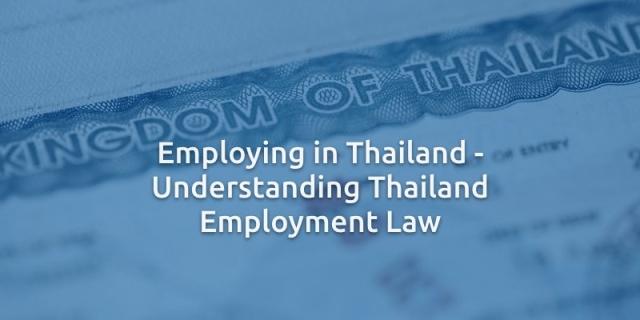Thailand, one of the largest economies in Southeast Asia and a key member of the Association of Southeast Asian Nations (ASEAN), stands out in the region for its vast employment legislation and protectionism in regards to the employee. Don't be fooled by its easy-going people: read these guidelines to stay compliant and ensure you understand Thailand employment law.
1. Employment Contracts
All relationships of employment are viewed as contracts of hire of services. Employment contracts may be made for a certain period - fixed- or indefinite-term, and are terminable without cause only provided that severance pay is paid as specified under the Labor Protection Act.
2. Social Security
The Social Security Office is responsible for implementing government policies on social welfare. These policies are funded by contributions from both the employer and employee which are fixed at 750 THB (25 USD) each. The employee’s share will be deducted from the local salary, for which a minimum salary of 50,000 THB is required. However, voluntary contributions of up to a maximum of 4,600 THB can also be made.
Benefits cover unemployment, sickness, disability, and maternity leave. Some of these benefits are available to foreigners in Thailand. In order to qualify, you must have a valid work permit and each beneficiary must have made the minimum required contributions determined per benefit.
3. Voluntary Provident Fund
An employer may alternatively and voluntarily establish a Provident Fund which is used to provide security to an employee in the case of retirement, resignation, death, or termination. The employee can contribute a minimum of 2% to a maximum of 15% of his/her wages. The employer must contribute no less than the employee's contribution.
4. Working Hours
Normal working hours in Thailand are 8 hours per day or 40 hours per week. Daily overtime is paid at a rate of time and a half. Every employee is entitled to a "rest" of more than one hour a day after working five hours.
5. Employment of Foreign Nationals
While all employment regulations are applicable to both locals and foreign nationals, employers must comply with additional requirements to hire expats in Thailand. The number of requisites increase and other government institutions, such as the Immigration office, are vigilant in this employment relationship.
In general, expatriate employment is governed by the Alien Employment Act which provides criteria designed to protect the domestic labor market. In order to employ a foreign national, the Department of Employment will look at things such as: whether the work could be done by a Thai; that the foreigner is appropriately qualified; and whether the job fits the needs of Thailand. Note that all employees must have a valid work visa before entering the country and that a number of requirements must also be met by employers before the employment relationship starts. Visit our previous post on 5 Common International Work Permit Mistakes to learn what not to do when hiring international employees.
It is evident that hiring in a foreign country, whether it is local nationals or expatriates, is not as easy as hiring in a well-known jurisdiction. Once you find your potential candidate, you must follow a number of steps to ensure absolute compliance with labor and tax regulation which often varies from country to country. Give us a call and we will provide you with expert advice and guidance on your international business expansion.



